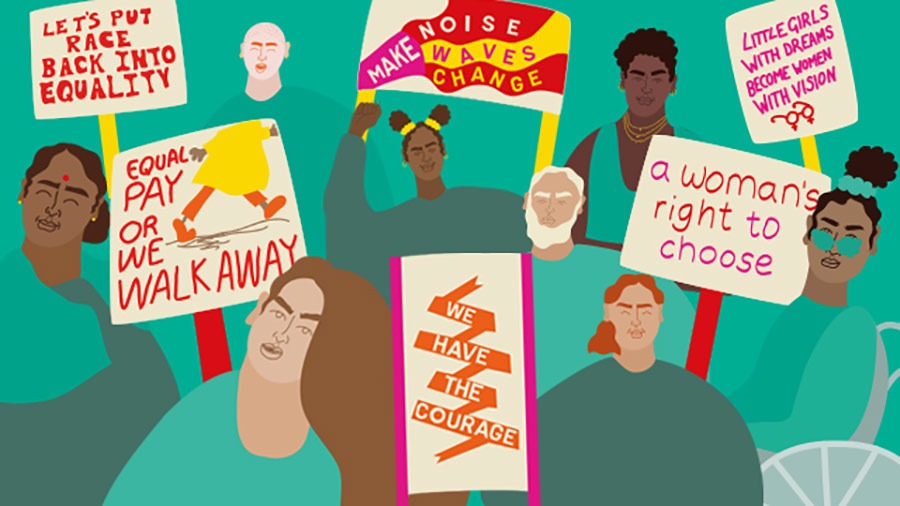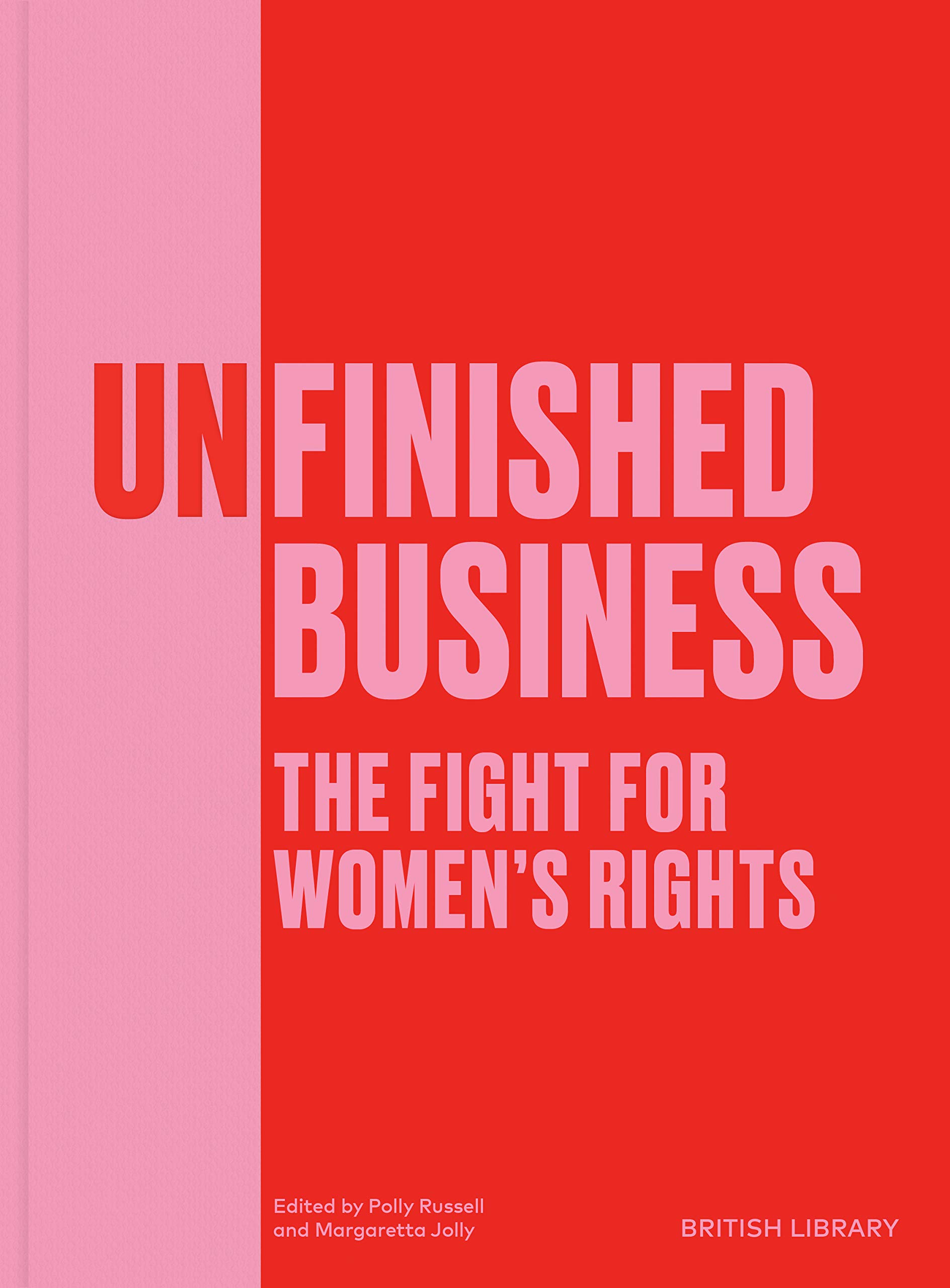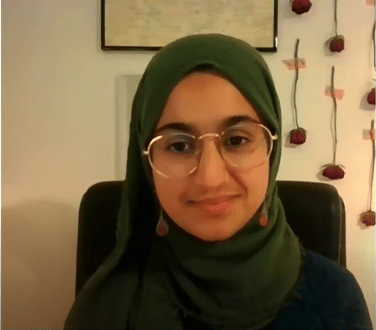
In October 2020, the British Library launched a major exhibition Unfinished Business: the Fight for Womens Rights. It explored contemporary debates around women’s rights and gender equality in the UK, in the context of a long history of activism. Although much has changed for the better, the fight for women’s rights remains unfinished business.
Studio12 worked in partnership with the British Library and Leeds Libraries to curate a virtual exhibition highlighting Leeds’s unique contribution to the campaign for gender equality. Leeds has a particularly strong history of female activism from the fight for suffrage, Reclaim the Night Marches, union strikes for fairer working conditions to the current campaign to make Leeds the first women friendly city. The exhibition featured inspirational local women past and present, events that have shaped the experience of women in Leeds, and items from Leeds Libraries special collections that connect to the wider history of women’s rights.
To celebrate the exhibition Studio12 led a series of three poetry workshops and two performance mentoring sessions with five young poets, hosted by the renowned literary activist, writer and playwright Khadijah Ibrahiim. The workshops probed the themes of women’s voices, activism and the fight for a fairer world. Participant’s poetry was transformed into five spoken word performance films, which were premiered online at a special live Spoken Word Showcase and formed the topics for a panel discussion between Khadijah and poet/activist Suhaiymah Manzoor-Khan.
This was followed by a spoken word takeover by The Sunday Practise – a leading grassroots jam session, poets, DJs, musicians and vibes night from Leeds that represents a wide cultural perspective of women poets in the UK. Studio12 had 300 engagements via social media in the lead up to the Showcase from a wide range of cultural organisations, women’s groups and artists. Over 300 people tuned in with the largest audience in Yorkshire, followed by London.
Visit the Secret Library Leeds website to view the Leeds Libraries and Studio12 virtual exhibition.
Visit the Living Knowledge Network website to watch the Spoken Word Showcase.
Visit Instagram to find out more about The Sunday Practise.
Visit the British Library’s website to view their Unfinished Business exhibition.

“The energy of the performance was really intimate and naked and vulnerable and I loved it… Well done everyone so great to have been on this journey with you all. I will miss the creative space!”

“I loved taking part in the workshops and having the much needed push to write again. Thank you so much for the opportunity.”
Special thanks to the talented poets involved: Enas Saeed, Grace Ronnie, Lulia Togara, Natalie Davies and Penny Newell. You can find out more about them below.
Participant Bios
Grace Ronnie is a Leeds-based spoken word poet and singer-songwriter. She takes influence from many northern poets and musical artists such as Dr John Cooper Clarke, Toria Garbutt and Alex Turner. Grace incorporates humour to tackle a range of life experiences from sexual harassment and drug addiction to simply loving her pet cat.
Instagram: @graceronnie_poetryandmusic


Natalie Anastasia Davies is a Northern poet of Grenadian descent, who draws upon themes of dual heritage identity, life cycles, inequality and the female experience. She is a community worker and freelance facilitator who utilises experimental techniques to explore poetry and mental wellbeing with writers and communities. Natalie runs a weekly workshop named People Poetry and has performed for Leeds Lit Fest, Black Voices Matter and Extinction Rebellion.
Instagram: @natalie_anastasia_poetry
Facebook:
https://www.facebook.com/natalie.anastasia.poetry/
Enas Saeed is a poet and a body positivity advocate. Her poetry delves into themes such as womanhood, religion and identity. She’s the resident poet for the Sunday Practise and was recently featured on BBC Leeds radio for her work.
Instagram: official_enas


Lulia Togara is a spoken performance artist. A writer interested in the theatre of words from both angles of writing text and the performance of them through the medium of poetry and plays. Creating landscapes through her words that encourage introspection whilst stimulating reflection on intersectional relationships.
She has just finished a project with Cast Theatre where she was commissioned to write a short play whilst being mentored by a more experienced writer to grow her craftsmanship, whilst also helping to facilitate writing workshops with young people as an Emerging Writer. Her next project will be with Interplay Theatre which will include the development of a new workshop in order to bring people together and improve mental health through creative writing post lockdown.
Instagram: luliatogara
Penny (she/her) is a queer poet from Leeds. She teaches Gender and Performance at King’s College London, her poems have featured on BBC Introducing Arts and in places like The Poetry Review, and by far her favourite platform for poetry is The Sunday Practise in Leeds – which she misses greatly and cannot wait to return to when life allows.

“I enjoyed the process of being together with other creatives, reading and writing poetry together – especially in these isolated times. I know it sounds simple, but being encouraged to read and look into poets we might not have otherwise, has been really good for me too!”
Panellist
Khadijah Ibrahiim is a literary activist, published writer and playwright, who combines interdisciplinary art forms to reimagine poetry as performance theatre. Hailed by the BBC as one of Yorkshire’s most prolific poets, Khadijah has performed and produced art programmes in the USA, Caribbean, Africa and Asia.


Suhaiymah Manzoor-Khan is an educator, writer and poet from West Yorkshire. Her work disrupts and interrupts questions of history, race, knowledge and power – interrogating the political purpose of narratives about Muslims, migrants, gender and violence.